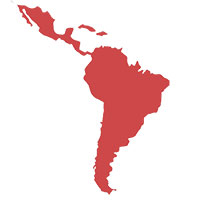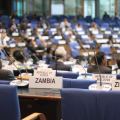Ghosts of the Past Haunt Lima
Hamish M | December 13, 2014.
Panic has set in after the Lima climate conference failed to produce an agreement by the Friday deadline, and delegates face a potential repeat of the Copenhagen meltdown of 2009. After negotiations stalled yesterday over fundamental issues of the draft text—responsibility, loss and damage, and adaptation—the co-chairs suspended talks to produce a final draft that they hoped would be acceptable to all parties. Frustrated delegates were forced to wait long until the night as the opaque drafting process took place behind closed doors.
Shortly after 2am, a snap session of the parties was called for the presentation of the new text. Wild scenes ensued as negotiators flocked to get their hands on a copy of the new draft. The co-chairs acknowledged that the release of the text is inevitably a “moment of unhappiness”, but that, in a sign of the difficulty of the past fortnight, they had tried to “share the unhappiness in an equal fashion.”
In a concession to developing nations, the new text was lodged firmly within the principles of the original convention, softening language on responsibility for poor countries. In another win, the text gave prominence to the most recent Intergovernmental Panel on Climate Change report. In a nod to Bolivia, the draft text makes mention of the worrying gap between total aggregate emissions, and the maximum global carbon budget for allaying catastrophic climate change. The price, however, was the absence of any provision for loss and damage, and the retention of the Warsaw-era formulation of INDCs that relegates adaptation to a secondary concern.
Anger erupted when just minutes after the release of the new text, the co-chairs made attempts to conclude discussions, and therefore the conference, by forcing immediate agreement on the text. Dozens of nations instantly protested the decision to rush the deliberations, pointing out agreement was impossible when they had not even had a chance to read the text.
In a worrying sign, many parties voiced concerns that they had not been consulted on the re-drafting process. To the shock of the conference, Sudan protested that entire Africa Group had been left out. Rubbing salt into the wound were revelations voiced by the Marshall Islands that developed nations had enjoyed advance viewing of the new text, raising serious concerns over the much-lauded transparency of the drafting process. The Verb can confirm that it received a copy of the draft text prior to its release in the plenary. Certainly, all of the objections from the floor were from developing nations. Developed nations were troublingly silent amidst the torpor.
As the co-chairs insisted that further delay was not an option, anxieties boiled as delegates feared a snap decision that would steamroll developing nations into capitulation. The watershed moment, however, came from an impassioned speech from the Venezuelan delegation. In a three minute address that may have changed the fate of the COP, the Venezuelan chief negotiator, Claudia Salerno, dropped the bombshell that the behaviour of the co-chairs “reminded [her] too much of Copenhagen.” The ongoing humiliation of international diplomacy, the 2009 Copenhagen conference fell to pieces in the final hours as a text negotiated privately between the major powers was pushed through at the last minute.
For this year’s Peruvian hosts, desperate to avoid the same ignominy for Lima, the analogy struck a nerve. Salerno insisted that denying developing nations the chance to deliberate privately would cripple the hopes of the conference. Given that delegates had shown patience towards the co-chairs, having waited until 2am, they too should be granted the same allowance of time. Addressing the conference president by his first name, Salerno made a personal plea for reason: “Manuel I trust you and would like for you to give all countries an opportunity. We know you’ve been working since 2009. We would like it to be reciprocated”. Invoking the spectre of Copenhagen was clearly a successful strategy, with the co-chairs soon declaring a six-hour hiatus.
As talks resume this morning, the fate of Lima is still up in the air. Developed nations have been vocal about their opposition to major parts of the text. The US insisted that there were many things that they strongly wanted that were not reflected in the text—the scope, differentiation, ex ante review, and pre-2020 forum. However, in a thinly-veiled threat to the conference, and in a ruthless political manoeuvre, the chief negotiator suggested that the fate of the UNFCCC would be at stake should Lima fail. In a rhetorical flourish, New Zealand said that the text contained “dead rats that have to be swallowed.” The martyrdom narrative of the developed nations, however, is being overshadowed by violent opposition and splintering disunity from the developing world.
In a dramatic move, the Marshall Islands and the Cook Islands, amongst others, have split from AOSIS to support the deal, despite its major shortcomings, declaring that the need for progress trumps the need for perfection. Joining them in support of the deal are the powerful AILAC group, the EU, and the Umbrella Group. In opposition are the Africa Group, China, the developing countries, and the least-developed countries. By forcing this latter group to oppose the text, developed states have pulled off a political coup, deflecting blame for the potential failure of Lima onto the developing world.
Just minutes ago, despite the gridlock, the co-chairs concluded the formal negotiations and handed over the executive function to next year’s committee. The president will now facilitate private negotiations in a high-pressure race against the clock to save Lima, and hopefully the fate of the climate with it.













comment